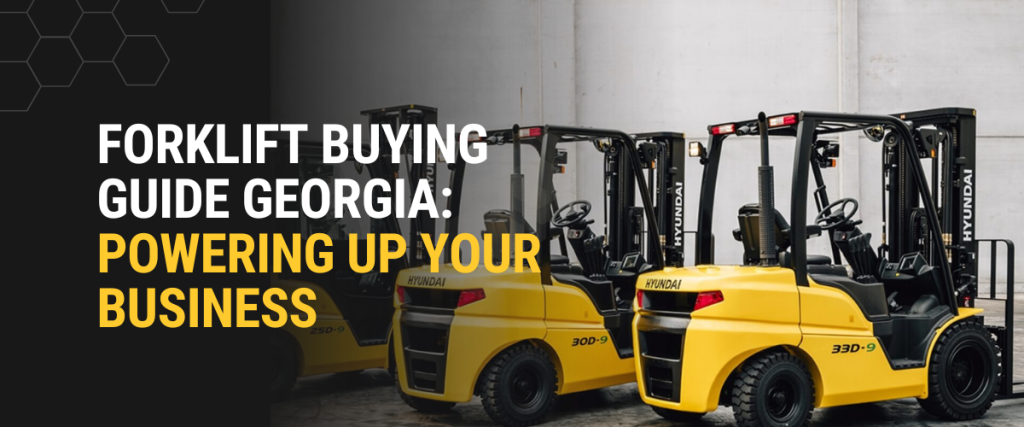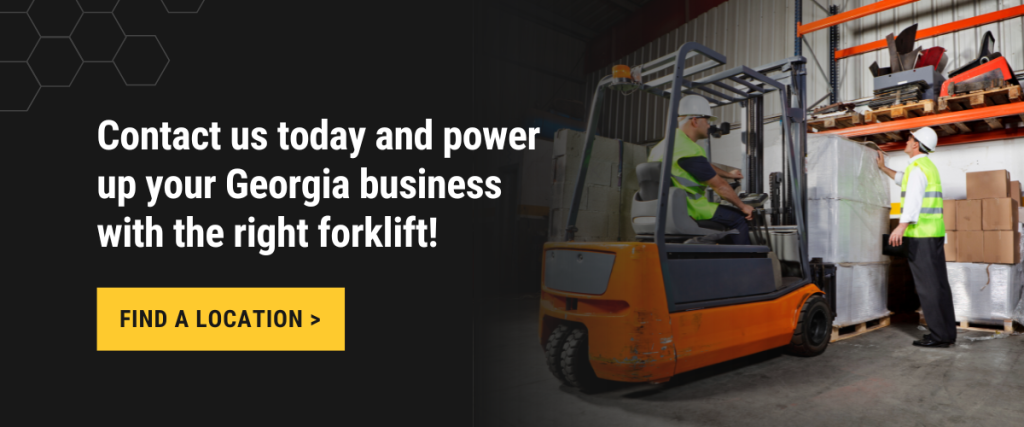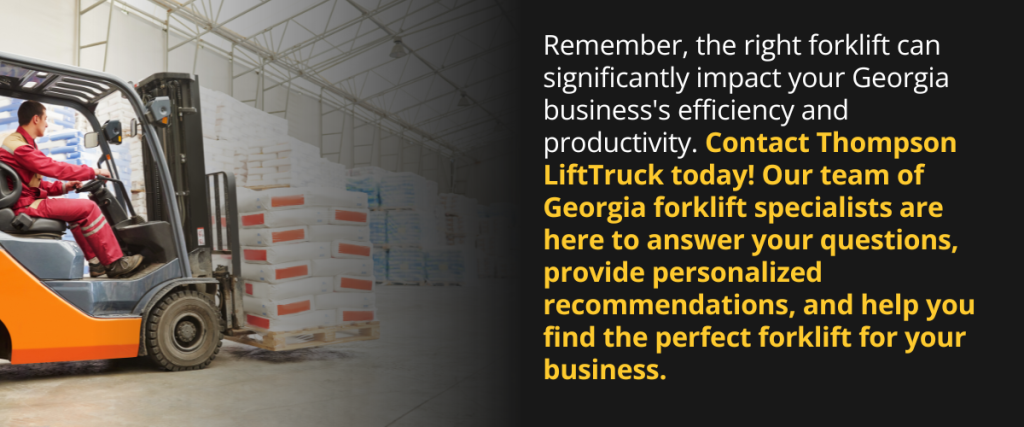
Forklift Buying Guide Georgia: Powering Up Your Business

Georgia’s business landscape is booming, from bustling warehouses in Atlanta to sprawling construction sites down south. Keeping your operation moving smoothly requires the right equipment. That’s where a forklift comes in – a powerful tool to elevate your efficiency and productivity.
However, with so many models and features available, choosing the perfect forklift can feel overwhelming. Fear not, Georgia entrepreneurs! This guide empowers you to make an informed decision. We’ll navigate you through key considerations specific to Georgia’s diverse industries, ensuring you get the perfect forklift to conquer any job, from maneuvering delicate furniture in a climate-controlled showroom to handling heavy building materials on a dusty construction site.

Understanding Your Georgia Operation
Before diving into specific models, take a step back and assess your specific needs. Here are some key questions to consider:
- Lift Capacity: What’s the heaviest weight your forklift will need to handle?
- Application: Will it be used primarily indoors, outdoors, or both? What kind of terrain will it navigate (smooth warehouse floor, uneven construction site)?
- Lift Height: How high will you need to stack materials?
- Frequency of Use: Will the forklift be in constant operation, or used occasionally?
Forklift Types Tailored for Georgia Businesses
Now that you understand your needs, let’s explore the different types of forklifts available:
- Electric Forklifts: Quiet, clean, and ideal for indoor use. Perfect for frequent, light-duty applications in warehouses or distribution centers.
- Internal Combustion Forklifts (IC Forklifts): These include propane, gasoline, and diesel models. They offer more power for outdoor use in Georgia’s diverse environments, from construction sites to lumber yards. Consider ventilation needs for indoor use of IC forklifts.
- Rough Terrain Forklifts: Designed for uneven surfaces and outdoor environments common in Georgia’s construction and agricultural sectors. They offer increased ground clearance and larger tires for better traction on rugged terrain.
New vs. Used: Finding the Right Balance for Your Budget
New Forklifts:
Pros:
- Peace of mind: New forklifts come with warranties, protecting you from unexpected repair costs.
- Cutting-edge technology: Latest models often boast improved fuel efficiency, ergonomic designs for operator comfort, and advanced safety features.
- Reliability: You can expect a new forklift to perform consistently with minimal downtime.
Cons:
- Higher upfront cost: New forklifts come at a premium compared to used models.
- Depreciation: The value of a new forklift depreciates quickly in the first few years of ownership.
Used Forklifts:
Pros:
- Cost-effective: Used forklifts can offer significant savings compared to new models.
- Variety of options: You can find a wide range of used forklifts in good condition, allowing you to match your needs and budget.
Cons:
- Inspection is crucial: A thorough inspection by a qualified mechanic is essential to identify potential problems before you buy.
- Limited warranty: Used forklifts typically come with shorter warranties or no warranty at all.
- Potential for higher maintenance costs: As a used forklift ages, maintenance needs might increase.
Renting vs. Buying: A Matter of Time and Usage
Renting a Forklift:
Ideal for:
- Short-term projects
- Seasonal fluctuations in workload
- Trying out different forklift models before purchasing
- Situations where storage space is limited
Considerations:
- Rental rates can add up quickly for long-term use.
- Rented forklifts might not be readily available during peak seasons.
- You may have limited access to customization with attachments.
Buying a Forklift:
Ideal for:
- Businesses with frequent or ongoing forklift needs
- Operations requiring specific attachments for specialized tasks
- Long-term cost-effectiveness when usage is high
Considerations:
- Requires a larger initial investment
- Storage space needs to be factored in
- Regular maintenance is essential to ensure optimal performance
Forklift Attachments: Expanding Your Capabilities
Forklifts are incredibly versatile machines, but attachments can take their functionality to a whole new level. Here are some popular examples:
- Side Shifters: Allow for precise load placement without repositioning the entire forklift.
- Fork Extensions: Extend the reach of standard forks to handle oversized pallets or loads.
- Bucket Attachments: Transform your forklift into a powerful loader for handling bulk materials like gravel, sand, or debris.
- Rotators: Enable 360-degree rotation of the forks, perfect for maneuvering loads in tight spaces.
- Paper Roll Clamps: Securely handle and transport rolls of paper or fabric.
- Man Baskets: Lift personnel safely to perform maintenance or access high areas.
By investing in the right attachments, you can significantly increase the versatility of your forklift, allowing it to tackle a wider range of tasks within your Georgia business.

Next Steps: Finding the Perfect Forklift for Your Georgia Business
With a clear understanding of your needs, you’re now ready to explore specific models and pricing. Keep these key considerations in mind as you embark on your forklift-buying journey. Remember, the right forklift can significantly impact your Georgia business’s efficiency and productivity. Contact Thompson Lift Truck today! Our team of Georgia forklift specialists are here to answer your questions, provide personalized recommendations, and help you find the perfect forklift for your business.
